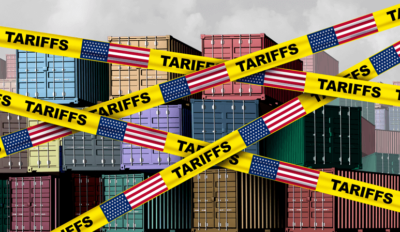The Silent Sales Killer: Credit Anxiety (And What to Do About It)

The automotive industry is facing a unique set of challenges right now, largely due to affordability pressures, complicated by the recently announced tariffs. Different automakers are exposed differently based on their manufacturing and parts sourcing, with some better positioned than others to absorb the costs, especially in the short term.
Meanwhile, dealers currently have a one- to two-month inventory of new pre-tariff vehicles, helping to temporarily cushion buyers from the immediate impact of the new tariffs.
While the full impact of these tariffs won’t be felt immediately, their disruptions and ripple effects are inevitable. All dealerships will face supply disruptions, higher vehicle prices, increased parts costs, shrinking margins, and likely fluctuating demand.
For consumers, the financial pressures go beyond just rising costs — they represent a growing sense of uncertainty and anxiety. With the average price of a new vehicle sold in the United States already approaching $48,000 and monthly payments of around $742 (varying by rate and term), affordability is becoming an even greater concern.
It’s not yet clear how much of the new tariff costs car buyers will shoulder, but real changes are coming, and as uncertainty grows, trust is being tested. This is where your dealership can make a real difference by reassuring customers, guiding them through the uncertainty, and helping them feel confident in their purchasing and financing decisions.
Getting an auto loan is overwhelming enough in the best of times, but adding in falling consumer sentiment, tariff complications and near-record-high interest rates, many are now facing something even more challenging: credit anxiety.
In this article
When Credit Anxiety Meets a Tougher Market
Credit anxiety is quietly reshaping the way consumers approach the car-buying process — and it’s becoming even more prevalent as economic pressures mount. In a recent survey by the Federal Reserve Bank of New York, one-third of people said they expect to be rejected when applying for a car loan in the coming year.
It’s not just about poor credit. Many Americans are already carrying more debt than savings. Credit anxiety affects anyone who feels uncertain, vulnerable, or unprepared to discuss their financial situation.
With rising vehicle prices, historically high interest rates, and tightening credit markets, more buyers are second-guessing their decisions, fearing they may not qualify for favorable financing.
The situation is made worse by tariffs, expected to raise the cost of ownership for all buyers, not just those with less-than-perfect credit. Even buyers with decent credit scores are feeling the strain, as the same vehicle that once seemed within reach now feels out of reach.
This strain doesn’t just hit when customers are ready to buy — it starts way earlier, even before they step onto your lot. For many, the most stressful part of the car-buying process starts with the uncertainty: Will I be able to afford this?
They worry about their credit, feel nervous about being judged, and dread the moment when they’ll have to fill out that financing application.
This emotional burden isn’t just a psychological roadblock; it directly impacts the car-buying process. When customers are uncertain about their credit and overwhelmed by rising prices, they’re more likely to hesitate, disengage, or even walk away. As a result, trust in the dealership can be damaged before the conversation even begins.
The Consequences of Credit Anxiety — For Shoppers and Dealers Alike
Credit anxiety doesn’t just make a buyer feel uncomfortable, it can directly affect their behavior, their decisions, and ultimately, your ability to close a deal. And as affordability shrinks and economic pressure builds, the ripple effects are being felt on both sides of the showroom.
For Consumers, the Stakes Feel Higher Than Ever
When buyers are anxious about their credit, they often start to second-guess the entire process.
They might delay applying for financing or avoid it altogether. Some buyers will fixate on monthly payments without understanding what they qualify for. Others may refuse to fill out a credit app in the store because they’re afraid of being embarrassed in front of a spouse or sales rep. And if they’ve heard about the tariffs driving up vehicle prices, the fear becomes even more real: “What if I go through all this and still can’t afford anything?”
That kind of fear leads to stalled decisions, walkaways, or complete disengagement. Even buyers who start the process with good intentions can become overwhelmed when the numbers don’t work out as they had hoped. And if the credit conversation doesn’t feel safe and transparent, they’re more likely to abandon the deal rather than face the discomfort.
For Dealers, The Impact Shows Up in the Metrics
From the dealership side, credit anxiety can quietly erode key performance indicators.
You may see fewer completed credit apps, both online and in-store. More “just-looking” shoppers disappear once financing is mentioned. More soft leads that never convert. More dead ends in the finance office. And more time was wasted on deals that were never structurally viable from the beginning.
As tariffs begin to affect pricing, particularly on popular imports and essential vehicle components, affordability issues are only going to get worse. That means more shoppers qualify for less, and more friction at the exact moment when trust matters most.
Even your best sales team can’t overcome a process that makes buyers feel judged, overwhelmed, or left in the dark.
And here’s the thing: this isn’t just a finance department issue. It affects your entire sales funnel, from website visits to appointment shows to showroom closes. When buyers don’t feel confident about financing, the path to purchase gets longer, more complicated, and far more fragile.

Easing Credit Anxiety: What Dealerships Can Do Right Now
If credit anxiety is rising, and all signs suggest that it is, forward-thinking dealerships have a clear opportunity to step in and adapt their process to meet buyers where they are.
This isn’t about lowering standards or pushing bad loans. It’s about creating a financing experience that feels less like a judgment and more like a conversation, one that builds trust from the very first interaction.
Here’s how to do it.
1. Let Buyers Apply on Their Terms — Without the Stress
Credit-anxious buyers want privacy, simplicity, and control. Offer a soft-pull pre-qualification tool on your website – mobile-friendly, clearly labeled “no impact to your credit score,” and secure. Don’t require an SSN or DOB unless necessary. By removing barriers, you make the process feel less invasive.
And when buyers get an immediate decision, it builds trust. Nothing adds to anxiety more than receiving a generic “Thank you for your information. Someone from our dealership will be in touch shortly.”
Consider rethinking how your credit application looks from a buyer’s perspective. Most credit applications still look like tax forms from the early 2000s. For anxious buyers, that’s a problem. Make your credit application more human and approachable.
- Break it down into easy, step-by-step sections.
- Offer explainer videos or tips that walk buyers through your approval process.
- Use plain language, not jargon.
A friendly, approachable form doesn’t just improve user experience — it’s a trust signal. Don’t bury your “Get Pre-Approved” CTA. It’s one of the highest-converting buttons on most dealership websites. Place it where buyers are making decisions, like on your vehicle detail pages (VDPs). A clean, confidence-building application experience turns hesitation into action, leading to sales.
2. Start the Credit Conversation Early — In Store, On Their Terms
When buyers don’t know what they qualify for, everything becomes guesswork. In today’s market, with tight budgets and high emotions, that uncertainty can lead to disappointment – or worse, total disengagement and no deal at all.
If you aren’t already, consider shifting to a “Credit First” approach that initiates the credit conversation early in your process with a soft-pull pre-qualification. It’s not just good for customers; it’s good for business.
- Buyers gain clarity before they even get attached to a vehicle, and they may not be able to finance it.
- It shows your dealership is focused on transparency, not pressure.
For your dealership, the benefits are clear:
- Work the right car and the right deal, right from the start.
- Close more deals, faster.
- Avoid costly rehashes in F&I.
- Increase PVR through earlier product conversations.
- Build trust by guiding, not gatekeeping.
When anxiety is high, timing matters. Bringing credit to the front of the conversation sets a confident, customer-first tone and keeps the deal on track.
3. Reframe the Finance Office as a Safe, Educational Space
Too often, buyers see the finance office as the final hurdle, a place where they brace for rejection or confusion. It’s time to flip the narrative.
Train your F&I managers to be educators, not enforcers. When your team explains credit in plain language, outlines what buyers can do to improve their terms, and walks through lender expectations transparently, the customer leaves feeling informed and empowered.
We know F&I managers already have a lot on their plates, but making this shift could pay dividends by building customer trust and loyalty. That emotional shift can be the difference between a one-time buyer and a loyal return customer.
4. Be Transparent About Data Privacy
Credit-anxious customers aren’t just worried about being declined, they’re concerned about their personal information being misused. When buyers feel safe, they’re more likely to engage fully.
Imagine a customer who’s been burned by data leaks before. They are understandably nervous about their information. Reassuring them up front that their data is safe could be the difference between them moving forward with confidence or walking away.
Be proactive and let customers know exactly how their data will be handled, who it will be shared with (and who it won’t), and how they can opt out of unnecessary third-party outreach.
This level of transparency builds credibility and earns you the right to move the conversation forward.
Bottom Line: A Process Built on Trust Is a Process Built for Today’s Market
The combination of high interest rates, tightened credit, rising prices, and now tariffs is pushing more consumers to the edge of affordability—and the edge of comfort.
But dealerships that recognize this and lead with empathy, education, and smart technology won’t just survive, they’ll thrive.
When buyers feel safe, understood, and respected, they are not only more likely to apply but also more likely to make a purchase. From you.
If you’re exploring ways to build a more trust-first, credit-smart process in your store, we’re here to help. Let’s talk about what that could look like for your dealership.



